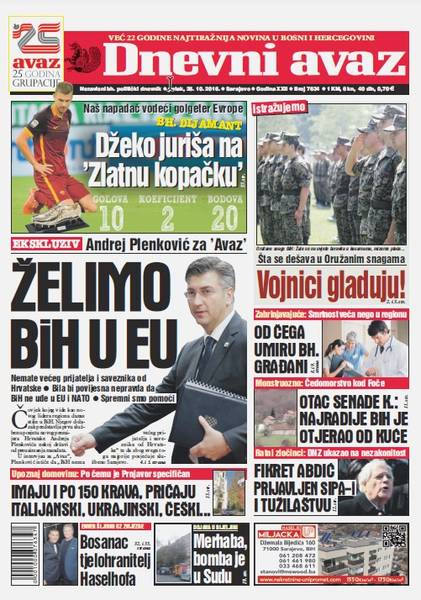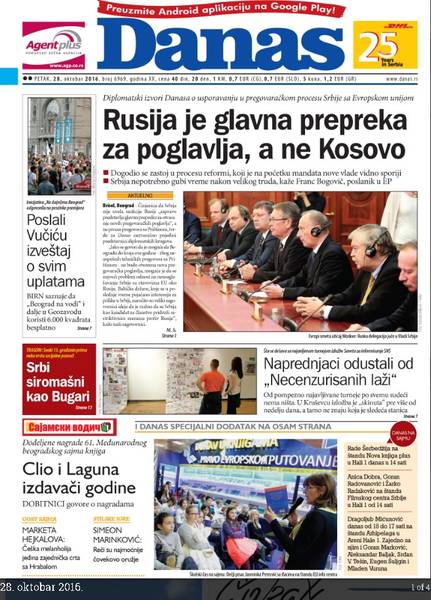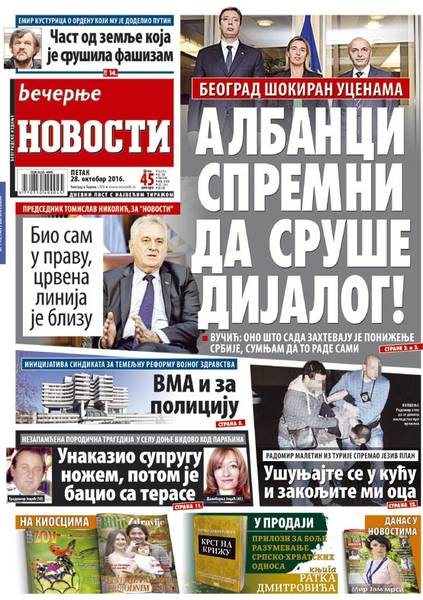Does Kremlin Finally Have a Man in Croatia?
Adelina Marini, October 28, 2016
 There numerous subjects in today’s press in the countries of former Yugoslavia, but the most important ones seem to me to be the first foreign visit of the new Croatian Prime Minister Andrej Plenković (to Bosnia and Herzegovina, of course), the ongoing Serbian drama around the Belgrade-Priština dialogue, and the spy novel, starring Russia. Let us begin with the fact that Moscow’s attention is now directed at the new political star of Croatia Ivan Pernar – leader of the anti-European and anti-NATO party Live Wall, which managed to secure eight seats in the September 11 snap parliamentary elections. Not a day goes by without having the vocal MP cause outrage in Croatian public domain, but this week he managed to draw the attention of Kremlin-sponsored Russian media as well.
There numerous subjects in today’s press in the countries of former Yugoslavia, but the most important ones seem to me to be the first foreign visit of the new Croatian Prime Minister Andrej Plenković (to Bosnia and Herzegovina, of course), the ongoing Serbian drama around the Belgrade-Priština dialogue, and the spy novel, starring Russia. Let us begin with the fact that Moscow’s attention is now directed at the new political star of Croatia Ivan Pernar – leader of the anti-European and anti-NATO party Live Wall, which managed to secure eight seats in the September 11 snap parliamentary elections. Not a day goes by without having the vocal MP cause outrage in Croatian public domain, but this week he managed to draw the attention of Kremlin-sponsored Russian media as well.
Jutarnji list reports that due to his anti-globalist, anti-NATO, and anti-EU positions, Ivan Pernar is now interesting to the Russian Sputnik agency, which is known by its content to be a main conductor of the policies of Russia and its President Vladimir Putin. Due to his performances, Ivan Pernar got invited for an interview by Sputnik, in which he stated that Brussels is nervous because there are people, who question EU bureaucrats’ fairy-tale of a better life in the EU, as well as the so called peace and stability, which NATO ensures. “Their alliance destroyed and diminished national freedoms and sovereignty instead of protecting them. NATO supports the destruction of legitimate governments through bombardment, instead of advocating for democracy”, said Pernar in the interview.
And more: “If it was not for Russia, no one would have stood against this. The USA would have been able to bomb and destroy any state, which does not serve their interests”, further said Pernar, quoted by Jutarnji. According to Vecernji list, ever since he entered Parliament, Ivan Pernar has turned into one of the most famous politicians both in the country and abroad. The newspaper reports that Pernar gave an interview to the Russian Sputnik agency, in which he spoke of NATO, Russia, and the USA, qualifying NATO as “a threat to the entire world, just like Germany under Hitler”. Leftist-oriented website Index chose a different accent on Ivan Pernar. The website reports, that MP Grozdana Perić of the ruling Croatian Democratic Union (HDZ) party has complained that she is tired of listening to Pernar.
This enraged the former leader of Live Wall Ivan-Vilibor Sinčić, who replied through his Facebook profile. “Well, we have had to listen to you for 25 long years. For 25 long years you polluted us with lies, demagoguery, gibberish. 25 long years of your stealing, looting, destruction. What more do you have to tell us that you did not have the opportunity to in these 25 years? [...] Now is the time for us to speak. Now is the time for our country’s policy to begin to be created by some new kids”, says in Sinčić’s posting.
Dayton must be upgraded
On the other hand, the leading piece of news in Croatia, but in Bosnia and Herzegovina as well, is the first visit abroad of Croatian Prime Minister Andrej Plenković. Most media quote his interview for the Croatian Vecernji list, in which he says that the first and key foreign policy priority of the new government is Bosnia and Herzegovina’s European path and also the equal status of Croats as one of the three constitutional peoples of the country. In his interview for Vecernji, Mr Plenković is far more cautious by backing President Kolinda Grabar-Kitarović’s position that the Dayton peace agreement needs to be amended, but underlines that this needs to be a decision of the political players in BiH. “The key is in their consensus, which I am convinced is possible and could receive strong support from the international community".
Plenković also gave an interview for one of the most circulated Bosnian newspapers Dnevni avaz, which is placed on the title page. The newspaper introduces the Croatian PM as “the person seen as the new leader of the region”. In this interview, Plenković is far more specific in talking about membership of Bosnia and Herzegovina in NATO and also about Russia’s influence. On the first subject the former MEP reminds that back in 2010 a decision was made at the NATO summit in Tallinn that BiH will be invited to the Membership Action Plan. This plan, however, could not be activated until all 63 properties of the former Yugoslav Peoples’ Army (JNA) are registered as assets of the BiH Ministry of Defence, which has not yet been done. Andrej Plenković believes that it would be a historic injustice for BiH to remain in the periphery of South-Eastern European countries.
In the Avaz interview Plenković says that it is time for leaders in BiH to begin talks of a constitutional reform and that the stage has arrived, where it is necessary to reform the Dayton peace agreement. Regarding Russia, Plenković says that the more indecisive the EU is in implementing the policy of enlargement towards the European neighbourhood, the larger space will be opened for closer relations of the region with Russia.
A scandal between Russia and Serbia?
 Blic quotes Russian media, according to which there is an unprecedented scandal in relations between Moscow and Belgrade. It is exactly the resolution of these problems, which was the main goal of the visit of Russia’s number one intelligence officer Nikolai Patrushev to Belgrade on Wednesday. Commersant comments on Danas’s Thursday discovery that several Russian nationals were deported from Serbia for their participation in the preparation of terrorist actions in Podgorica and that this information was not disproved by anyone. According to the front page of Blic, Patrushev left, accompanied by the espionage suspects. The headline of Politika is that Serbia is positioned in between foreign agencies. The newspaper disproves allegations that Mr Patrushev came to Serbia in an emergency.
Blic quotes Russian media, according to which there is an unprecedented scandal in relations between Moscow and Belgrade. It is exactly the resolution of these problems, which was the main goal of the visit of Russia’s number one intelligence officer Nikolai Patrushev to Belgrade on Wednesday. Commersant comments on Danas’s Thursday discovery that several Russian nationals were deported from Serbia for their participation in the preparation of terrorist actions in Podgorica and that this information was not disproved by anyone. According to the front page of Blic, Patrushev left, accompanied by the espionage suspects. The headline of Politika is that Serbia is positioned in between foreign agencies. The newspaper disproves allegations that Mr Patrushev came to Serbia in an emergency.
The daily recalls that all the way back on October 10 it quoted the Russian Ambassador to Serbia Alexander Chepurin that such a visit is scheduled. “The calendar of visits, announced and long prepared, disproves all the speculations that Patrushev arrived by surprise and in a hurry to Belgrade to resolve hot issues, like the Montenegro case for example, as well as the idea that the signing of a memorandum is just a smokescreen”, reports Politika.
Regarding this spy affair, in a commentary for the most circulated daily newspaper in Montenegro – Vijesti - Dragoslav Dedović criticises the already legendary press conference of Aleksandar Vučić, from which the aforementioned affair broke. “It could be said that Vučić, in his cautious ‘not East, nor West’ rhetoric is a worthy successor to Tito’s detached balance act on the Cold war wire. In any case, one could conclude from the chaotic statement in front of journalists, that we are talking about a Western agency. And here you have Montenegro. Someone has been tracking Milo Đukanović every day. ‘There is no way this was done by those down there, who were apprehended, which is something I am in no position to comment’, said Vučić. Meaning it is not them, but someone else. Who, then? ‘Very serious people’. Who? ‘Criminal organisations with foreign elements’ was the reply of Vučić. Whatever that means. Simply, Milo caught the wrong people for the right thing. Because, however, there are no politicians from Montenegro or Serbia in these gangs, it turns out that word is of criminal gangs with foreign elements, who have helped Milo stay in power anyways, because danger for him and Montenegro was real, but the adversary, presented to the Montenegro society, was a fake one”, writes  Dragoslav Dedović in his commentary.
Dragoslav Dedović in his commentary.
The Belgrade-Priština dialogue
Today’s headline of Danas states that it is not Kosovo, but Russia that is the main obstacle for the opening of new chapters in the negotiation process of Serbia with the EU. According to the newspaper’s diplomatic sources the delay in this process is due to the stalling of the reforms process, which has slowed down perceptibly since the new government’s term commenced. The newspaper quotes MEP Franc Bogovič (EPP, Slovenia), who believes that Serbia is uselessly wasting too much time after the huge amount of effort it has dedicated. The headline of Vecernje novosti in turn transfers the blame fully on the Albanians. The newspaper runs an interview with President Tomislav Nikolič, who believes that Albanians are using the negotiations with Serbia to squeeze out more rights and if this does not work, through negotiations they are trying to gain acceptance and membership to organisations, which are supposed to be organisations of states. According to Nikolič, the crossing of a red line is approaching.
Serbian state television RTS quotes an interview by Kosovo President Hashim Thaçi for the Austrian Die Presse, in which he says that facts about the Belgrade-Priština dialogue are presented to be worse than they actually are. He is convinced that both sides will soon reach the point where they will again be able to negotiate normally.
The TV channel also reports on the meeting of PM Aleksandar Vučić with the chief prosecutor for the International Criminal Tribunal in The Hague Serge Brammertz who again criticised Serbia for failing to hand over the Serb radicals wanted by the Tribunal – Petar Jojić, Jovo Ostojić, and Vjerica Radeta.
Translated by Stanimir Stoev
 Bakir Izetbegovic, Andrej Plenkovic | © Council of the EU
Bakir Izetbegovic, Andrej Plenkovic | © Council of the EU Aleksandar Vucic, Recep Tayyip Erdogan | © Serbian Presidency
Aleksandar Vucic, Recep Tayyip Erdogan | © Serbian Presidency Jean-Claude Juncker, Zoran Zaev | © European Commission
Jean-Claude Juncker, Zoran Zaev | © European Commission